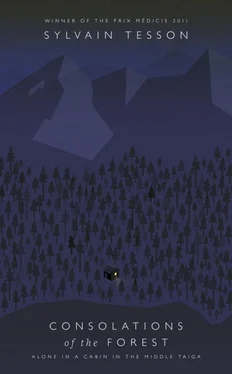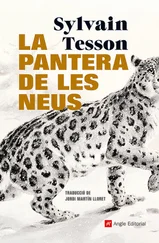Return to the lake via the geologists’ trail. The sun and clouds are playing chess: they place their pieces on the marble board, where the white and black spots move around with the speed of cavalry charges.
18 MAY
At noon, I leave the cabin to ascend the ‘white valley’, that curving combe of larches that cuts through the mountain a good half a mile to the north. Atop the rocky crest from which flow curtains of scree, the ravages of spring are clear: the lake is a mess.
To reach the summit that looms above the cabin, one need simply follow the serrated ridge. Beneath a Mediterranean sun, I pass turrets and rock pinnacles of Hercynian granite, rotten to the core. Small boulders not anchored to the slope by dwarf pines now roll beneath my feet and I’m afraid of crushing the dogs. By nightfall, after a third of a mile of tapering ridgeline larded with snow-filled couloirs, those steep, narrow gullies and fissures, I reach the summit, at 6,560 feet. Before me lie the arches of the Baikal Range, crowned sixty miles to the north by Mount Chersky. Sharp rocky crests spread out like starfish in all directions. Areas where the snow has melted are covered with the lichens so prized by the deer. A few days ago, a bear passed through the small, narrow saddle not far below. Hegel’s So ist – It is so – is the wisest thing to say before the incommensurable. I like the idea of having climbed up to find out what’s on the other side of my domain. Baikal is a closed basin, containing its own species, governed by its own climate. The inhabitants live on its edges as if around a village square. Most of them have never come here to take a look behind the ramparts of the fortress. One can be content with never going outside. Or, one can decide to go and have a look.
In 1643 a band of Cossacks led by Kurbat Ivanov, the first Russian explorer to reach Baikal, arrived from the west and climbed these peaks one day bearing guns and daggers. They perched on the ridge and discovered in one fell swoop, four or five hours’ march away, the Baikal Sea of which the various peoples of the taiga must have been telling them ever since the Yenisei, the mightiest river of Siberia…
Crossing slippery slopes and unstable couloirs, I find a good shelf planted with dwarf pines at 5,250 feet, where I spend a divine night with the dogs, the lake, the peaks and the starry fire-sparks that would like to join their sisters up in the heavens.
19 MAY
A rapid return: we slide through the couloirs to the first trees of the ‘white valley’. A powerful wind blows from the north, exciting the dogs. A storm is brewing. I’m in the hammock with a cigar and Giono’s The Song of the World when it hits. In a few seconds the tempest sweeps down from the mountains and the wind begins chewing up the icy plain. Within ten minutes, the débâcle ruins winter’s attempt to keep order in the world. The spectacle of this season must have dismayed the Prussian generals; it’s a Russian who celebrated the rite of spring.
The ice is breaking up: the water regains its freedom, cutting channels among the floes or submerging sections of the plain. The rain can’t find its way to the earth. Whorls of water return to the sky in little whirlwinds. In the confusion, the cedars send signals of alarm. Aika and Bek have taken refuge beneath the stoop of the shed. The anthracite breaches of open water show up starkly against the routed pack-ice. Wind flurries roil the waters. A rainbow, born at the tip of the cape, touches down in the middle of the lake, framing beneath its curve ebony clouds massed in the north. Lightning bolts strike just as the sky closes down, leaving only one shaft of light to turn the Buryat peaks blood-red as their range bears up under a ceiling of ink. I have just watched, in the space of ten minutes, the death of winter.
The storm carries its devastation off to the south. The lake settles down. In the cool air, beneath a satin sky, the unleashed wind shoves the drifting ice around, and shards of the former stained-glass window break off at the slightest touch with a rustle like rough silk. The débâcle has released the ebb and flow of the lake. I set my stool on a sheet of ice and spend the evening gently drifting. The water is back! The water is back! Nothing will be the same.
20 MAY
On this first morning of the lake’s liberation, the wagtails indulge in feats of illusionism: they hop about on the invisible scales of ice a millimetre thick that cover the stretches of open water. Towards noon, a hard rain falls with a voluptuous rattling on the humus. The Earth is drinking its fill. The rivers run almost all the way to the lake; only a hem of ice masks their arrival at the shore. In years and centuries to come, these waters that quench my thirst will be churned by the swells of the polar sea. When you consider the voyage of a snowflake, from the peaks to the lake and the lake to the sea via the rivers, you feel like a poor excuse for a traveller.
I remove two blood-sucking ticks from Aika. Life is a business of exacting tribute, and it’s the plants that pay for everyone else in the end!
21 MAY
The rafts of ice will shift about for a month at the mercy of the winds and currents, coming and going, and it’s possible that one day my bay will be closed again by pack ice. This morning the lake is a liquid plain. Not one ice cube on the oily black surface. I leave with the dogs for the River Lednaya, halfway between my cabin and Elohin’s, to try fishing there.
Along the shore, recent events have fostered an explosion of life. The day is full of flies. I have a nap on some sun-warmed rocks. On the embankments, clumps of anemones dot the sand. Ducks have landed in the open areas, eager for love and fresh water. They were living it up down south. They lift off clumsily when the dogs dash over to them. First men imitated birds to build planes, and now the first planes they built are imitated by ducks. The shoreline is in a permanent aerial ferment: eagles soar, geese patrol in gangs, gulls do nosedives, and butterflies, amazed at being alive, stagger through the air. Forty-eight hours have been enough for spring to bring off its putsch.
In the forest, the path traced by deer and bear tracks has opened up along the shore, a few yards behind the edge of the wood. Suddenly the doggies are barking: higher up on a rocky talus, a bear pokes its head through the rhododendrons. I hold Aika back by the scruff, while her brother cowers between my legs. Courage was doled out unevenly in that litter. Russians are emphatic on this point: when a bear shows up, do not run, do not look at the animal, don’t make any sudden moves, just tiptoe off murmuring reassuring things. The problem lies in inspiration: what does one say to a bear? I’m unprepared and, retreating delicately, find nothing better than: ‘Beat it, you big bunny!’ It works: the animal forages its way off through the undergrowth.
I catch two char at the mouth of the river. We go home via the shore. I walk along with the distress flares glued to my hands. The beaches and bands of littoral ice are covered with bear tracks. I’m not afraid, I know they will not attack me. In case of anxiety, think only of the last pages of Robinson Crusoe where Defoe describes the taciturn indifference of these beasts: ‘The bear was walking softly on, and offered to meddle with nobody…’
I reach the cabin, repair my fishing fly, feed the dogs, prepare my two fish, flick my knife into the wall, and go to bed with The Song of the World . Giono displays the usual reversal of values favoured by all who convert to natural laws: he personifies things and naturalizes people. In his works, rivers have legs and the coureurs des bois have ‘bodies like rocks’.
Читать дальше












